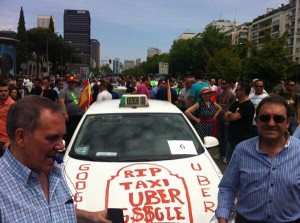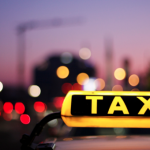Uber is a P2P transport company that allows users to get in touch with drivers through an app in their phones and be picked up and dropped off just as a regular taxi would. No cash is exchanged in the actual transaction as everything is managed through Uber, and the company is the one who actually pays the driver afterwards.

Thousands of taxi drivers just marched down Madrid’s Castellana as part of their “war against @Uber”
To some, it seems like a natural next step in smart city evolution and the disruption of a stalled transportation market. Well, Spanish law says otherwise.
Uber was born in 2009, and launched first in the city of San Francisco in 2010. Since then, they have expanded worldwide reaching 38 countries in 4 years with a $17B pre-money valuation in the latest funding round.
Since the very beginning, Uber hasn’t shied away from legal issues. In almost every city they have launched, authorities, cab drivers, transportation services and all sorts of other related agencies have been suing Uber for all kinds of reasons related to unlawful competition and illegal transportation.
After a few years in the US and Asiatic markets, Uber decided to take on Europe. It’s surprising to no one that here in Europe they have encountered a fierce opposition from the local transportation companies. On June 10th, the Generalitat de Catalonia bared their teeth on the recent launch of UberPop in Barcelona with first-offense fines of up to €6.000 for drivers. The outrage crescendoed the following day with a continent-wide strike of cab drivers on June 11th.
Why is Uber facing charges everywhere they go? Allow me to shine a light on Spanish regulation so you can see what all the fuss is about.
Ley 16/1987, de 30 de julio, de ordenación de los transportes terrestres.
This law is the one responsible for all the transportations by land in the Spanish territory. This means both private and public. The new law passed in 2013, regarding the same matter, has modified some of the articles of this law, but the core of the law still stands as it was in 1987.
But lets dig deeper in the Spanish regulation and lets see how it might affect Uber in Spain:
Article 42 of the law 16/87: in order to be able to transport people by land, the driver will have to have an authorization issued by the respective government agency, or the autonomic region government, if that was the appropriate case. Therefore UBER drivers should have this license issued before giving the service of transporting people.
Article 53 of the law 16/87: conditions regarding the performance of the activity. This article indicates the requirements in order to be a company allowed to transport people. This article, and the ones following it, indicates how in case of high demand there might be an extra supply of vehicles among other things, but it relates them all to the previously mentioned article 42 and the authorization needed to serve as transportation. Therefore Uber still needs every driver to have an authorization issued by the government.
Title III, Chapter IV of the law 16/87: private transportation. This whole chapter regulates the private transportation of people. The first definition we encounter is “what is private transportation?” Well, the law indicates that “PRIVATE” is those who are used only by the owner to transport himself and next of kin, AND in the measures and places regulated by the law for the vehicle itself. Uber drivers cannot be considered private because they do not meet the legal requirements, therefore they will be considered for legal sake as Public.
Article 62 of the law 16/87: Public transportation. Service provided employed by others and through a monetary compensation. Uber drivers should be under contract of Uber and receive monetary compensation. If that is the case, they still need government authorization to proceed with the activity.
Article 21, Article 23 of the law 16/87: insurance. All service providers must possess a mandatory insurance that covers the users of the vehicle (travelers), and also liability insurance in case of accident. Uber drivers should possess both of these insurances in order to provide the service.
Article 140 of the law 16/87: serious breach of law. The consequences of operating without a license are considered the highest breach by the law, and for those reasons the penalties must be the highest available for Uber.
So, per Spanish regulations, Uber should be considered public transportation of travelers, and consequently should have the company registered as so, the drivers insured and with government authorization to provide the service, and comply both the company and also the drivers to report all the mandatory tax filings with the Spanish Revenue Authority.
In the attempt of unravelling the complicated situation Uber is facing in providing its services in Spain, we tried to scratch the surface of the laws and shed some light what is really going on. It’s clear that Uber isn’t backing down from a fight and isn’t afraid to be the bad guy. This is a red-hot issue and laws can always be interpretive so tell us what think. Should the laws be changed to level the playing field or should Uber drivers be forced to jump through the same regulatory hoops as the taxis?
If the public is any indicator, the consumers will decide who picks them up. According to ITV News, Uber downloads are up 850% in London this week amid the protests. One thing is for sure, you can’t buy this type of worldwide press coverage.
Image via Shutterstock







Leave a Reply